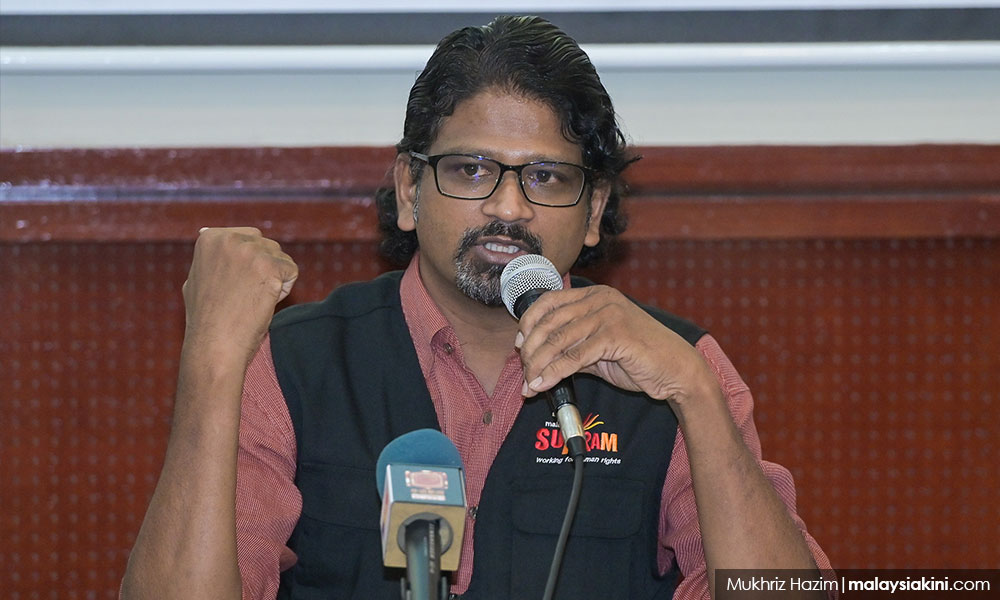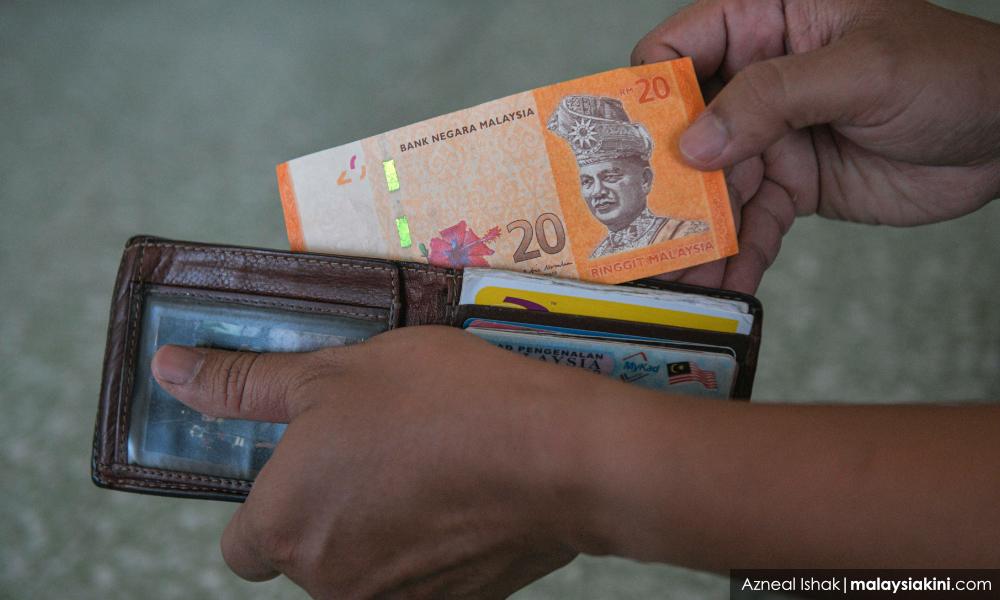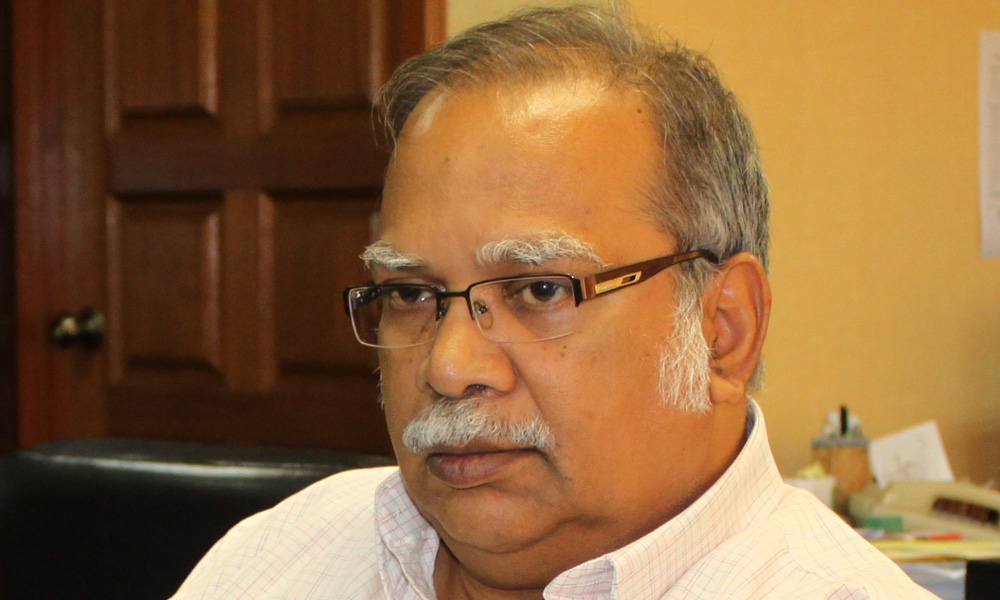In October 2020, Malacca-born Muthu was only 22-years-old when he was forced to relocate to a remote oil palm plantation in Bahau, Negeri Sembilan, where he was to remain in servitude until his RM3,500 debt was settled with his creditor.
His creditor is also the contractor in charge of the smallholding plantation and has a group of debtors in servitude at the plantation, said Suaram executive director Sevan Doraisamy.
Doraisamy said Muthu has alleged his experience at the plantation included degrading verbal abuses, harsh beatings, long hours of work that spanned up to 14 hours a day, restricted movements and low wages with no accountability of payments.
As workers of all nationalities in Malaysia celebrated International Workers' Day on May 1, Doraisamy is broadening the world's focus on forced labour in Malaysia to once again include the predicament of local workers entrapped in bonded labour that is prevalent in the informal sector.
He said that while bonded labour across all sectors that entrapped workers of all nationalities had to be addressed with equal vigour, the case of Muthu, when introduced to Suaram, had lifted a veil on the long-forgotten plight of local workers.
"In fact, the concealment of their horrific practices has been carefully refined over the years with the presence of a wide and intricate familial network of thugs exerting violence or at least threatening to do so.
"Their methods are blurred, especially with the way they approached their victims.
"It is so subtle that unassuming victims are not aware that they are falling prey to this system of bonded slavery until it's far too late," he said, referring to the latest case investigated by the organisation.

The names of those interviewed by Doraisamy mentioned here have been changed to protect their identity.
However, he was not able to gain access to the plantation that held Muthu, to interview others there.
The plantation is a smallholding that one contractor manages, and Doraisamy was not able to speak to him.
His research also relied on workers who were allowed to return home after their odd jobs at the plantation and a few town folks who were willing to speak.
He said the town folk called the practice "kottadimai" which means modern-day slavery in Tamil.
Doraisamy explained that the town folk relied on odd jobs, including non-daily work offered by this contractor.
Scouting for victims
He said the people of Bahau were very familiar with the contractor in charge of the plantation and how workers fell prey to beguiling promises of good pay, food and lodging, but they were too afraid to speak up.
Doraisamy revealed that the contractor would send scouts out to neighbouring towns like Tampin, preying on workers in the informal sector who were trying unsuccessfully to clear their debts with local toddy shops and other creditors.
"The scouts would offer to settle their debts and recruit them as workers on the plantation to pay off their debts with their new creditors.
"Only when they arrive at the plantation will they realise their new creditor has full custody over them with their movements limited to within the plantation grounds until they paid off their debts.
"Trapped within the plantation, the contractor will buy them their groceries, alcohol and cigarettes on their respective wages," he said.
Doraisamy explained that in most cases, the workers were not given any salary and had to work relentlessly to clear their debt.

Manipulated into debt bondage
While the system by which the plantation is managed is unclear, Doraisamy said all workers were "paid" daily, but they were not given any payslips or Socso.
"Muthu explained that there are two categories of workers on the plantation. Those who are bonded by debt whose movements are restricted within the plantation and those who sought out odd jobs at the plantation, only working when there was work but returned home at the end of work.
"Muthu used to be in the latter category of workers until one day he was arrested for stealing a motorbike in his neighbourhood, and bail was set at RM3,500," he said.
Doraisamy said for the two years before his debt bondage, Muthu occasionally did fieldwork which ranged from digging holes, ploughing land, planting saplings, applying or spreading fertilisers to protecting seedlings and other unspecified work on daily wages.
"On the day of Muthu's hearing, the contractor managing the plantation, and also his occasional employer, surprised him with his offer to pay the bail money," he related.
Doraisamy said Muthu, claiming to have been framed for the crime, accepted the loan to avoid going to jail while awaiting trial and inadvertently became bonded to the contractor.
"Only much later, Muthu would come to suspect that he was entrapped," he said.
Worker and young wife put through the same abuse
Doraisamy said when Muthu moved into the plantation, his young wife, unfortunately, followed along, and the contractor had convinced her that if she too didn't contribute towards clearing the debt, they would remain there for a very long time.
He revealed that the couple earned between RM42 and RM50 each daily, depending on the type of work they were doing, but there were also days unaccounted for in the monthly tally.
"Soon, they were both enduring the same abuses, including long hours of work, and the end didn't seem anywhere in sight.
"Muthu shared how one night the contractor and his thugs entered the house given to them and insisted they came out to work.
"When Muthu and his wife resisted, the contractor threatened to lock up his wife and harm her, so of course they relented," said Doraisamy, adding that the couple had worked from 6am to 8pm before that.
He said that night, the couple was not paid for the work performed and were told that wages for that day went toward clearing their debt.
Doraisamy said after two years, the couple could not bear the torturous environment that had also caused a strain in their marital relationship, so Muthu pleaded guilty to the crime he claimed not to have committed and went to jail.
READ MORE: Special Report: Escape from slavery
By the time he spoke with Doraisamy, Muthu had found a job with monthly wages in a place far from Bahau. He had spent four months in jail.
Doraisamy had interviewed two formed debt bonded labourers, but only Muthu had lodged a police report. So far, no action has been taken.
Decades of atrocious practices, human torture
According to Doraisamy's research, there have been other cases of workers who managed to escape from debt bonded slavery in plantations, but not all had endured hell under the same contractor.
He said that because activities in many smallholding plantations had gone unchecked, there is a tendency for these practices to continue.
"This was even when cases were highlighted in the media by local political leaders or, in one case, the then minister himself," he said.
Doraisamy said the atrocious situations of forced labour highlighted in 1983 by the then minister of Works and Public Amenities Samy Vellu had revealed their living conditions to the media and described them as huts or goat sheds.
He said Samy Vellu had also pointed out that the workers and their children had scars on their bodies from being beaten and tortured.
"It was dubbed the 'Hell Estate' as the most horrific bonded labour cases were uncovered at the Felda Selancar Ampat in southern Pahang.
"However, even such horrendous conditions failed to stir authorities into action as the then Pahang police chief denied any illegal activity there," he pointed out.

'Escape from Slavery'
Twenty-four years later, in 2007, Malaysiakini reported that bonded slavery of local workers and their families persisted through the escape story of M Avadiar, his wife and seven children who had claimed they were treated like slaves.
Muthu's experience since 2022 did not vary very much from what Avadiar related to Malaysiakini back in 2007 about what happened in the plantation in Jempol, Negeri Sembilan, 40km north of Bahau.
The story of his family and their escape formed a segment in a Special Report series by Malaysiakini titled "Escape from slavery".
The contractor in charge of the plantation in Jempol back then, who agreed to speak to Malaysiakini, admitted to having spent RM200,000 in settling worker debts before relocating them into the plantation.
In the final part of that series, Malaysiakini spoke to a Jempol MIC youth leader M Palani who blamed the bonded slaves themselves for their predicament, pointing out drinking problems and adding that the workers were "happy" to be in the condition they were in.
Meanwhile, Penang Deputy Chief Minister II P Ramasamy, who was reached for comments in his capacity at that time as a former academic, said the solution to the bonded slavery problem lay in the lack of legal enforcement by the authorities.
Pointing out that there was a loophole in the hiring system that plantation owners were abusing, Ramasamy added that there was little or no political will to address the problem.

Bonded labour continues to thrive
There is more evidence that bonded labour contractors carried on unquestioned despite cases reported to the police as recently as 2018 when Pahang state assemblywoman for Sabai, Kamache Doray Rajoo highlighted the experiences of a few who had escaped from plantations in Bahau.
However, Doraisamy said it was not clear if they were from the same plantation.
"Doray Rajoo had shared workers' hellish experiences on her social media and with the local police through police reports.
"One of the 2018 cases was of a girl forced into bonded labour at the age of 10, and another case of a 20-year-old man who escaped in 2017 having been enslaved there for two years.
"Three other teenagers, who also escaped the slave-like conditions, were assisted by Doray Rajoo to retrieve their respective MyKad and birth certificates that were retained by their employer," he said.
However, while confirming that such practices were still being carried out there, Doraisamy said these victims were reluctant to come forward with their stories.
Tackling basic issues now
However, it was Malaysia's ratification of international trade agreements in recent years that spurred the government to improve worker rights protection in labour-related legislation.
Last year, when Human Resources Minister M Saravanan launched Malaysia's first national action plan to tackle forced labour by 2025, it started to look like Malaysia had recognised the prevalence of forced labour in various sectors in the country.
The minister's trip to Geneva this year to adopt the International Labour Organisation's Protocol of 2014 to the Forced Labour Convention 1930 was yet another indication that political will to combat forced labour had changed.
However, while workers wait to see national legislation align with the commitments brought about in the protocol, Doraisamy believes that there were other basic issues that could be tackled head-on.
"Corruption, lack of integrity, lack of oversight and complaint mechanism as well as the inexistence of a proper labour system are some of the crucial reasons for the continuation of the bonded labour system, against both Malaysians and migrant workers," he stressed. - Mkini



No comments:
Post a Comment
Note: Only a member of this blog may post a comment.